Charles E W Bean, Diaries, AWM38 3DRL 606/63/1 - October - November 1916 - Part 8
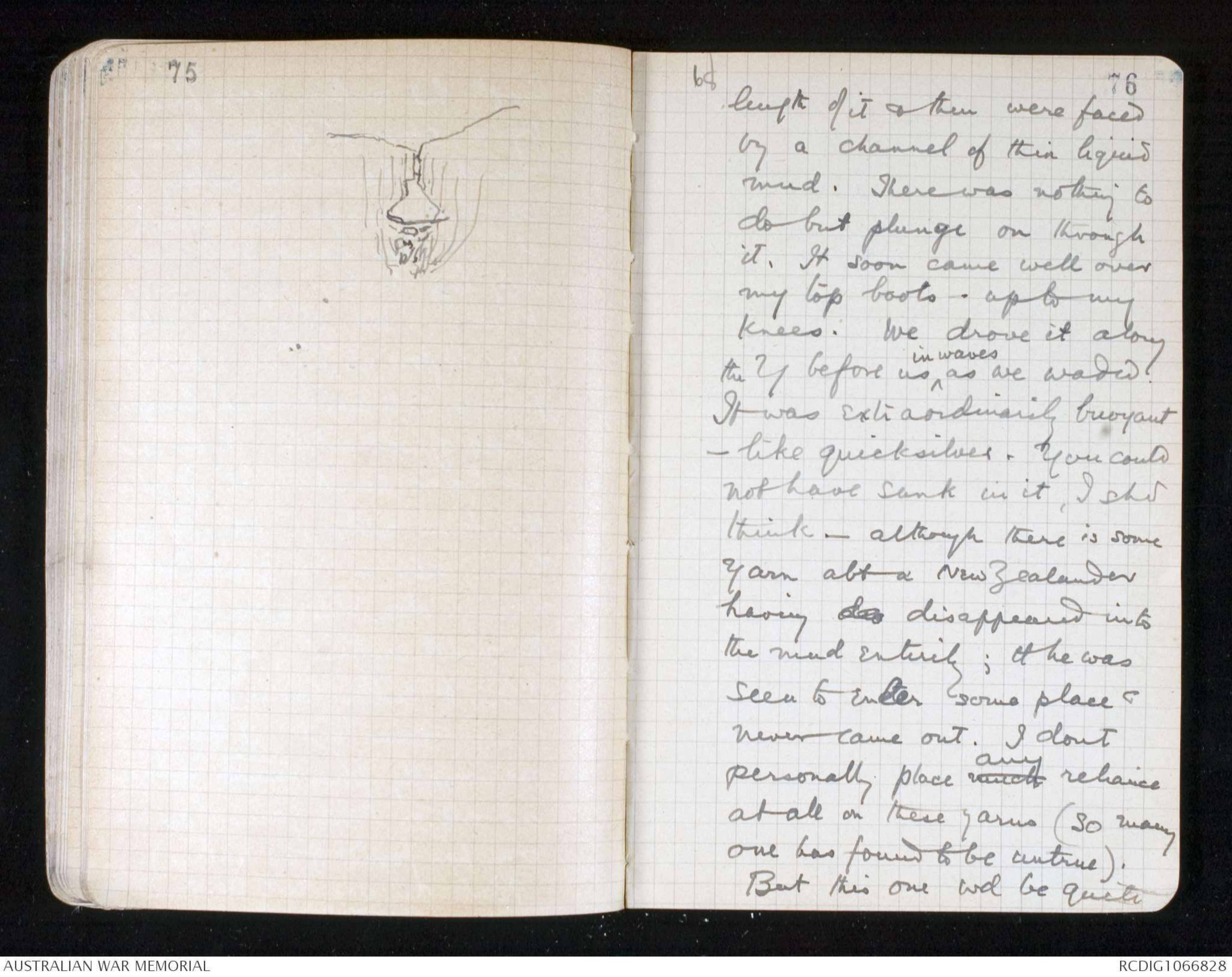
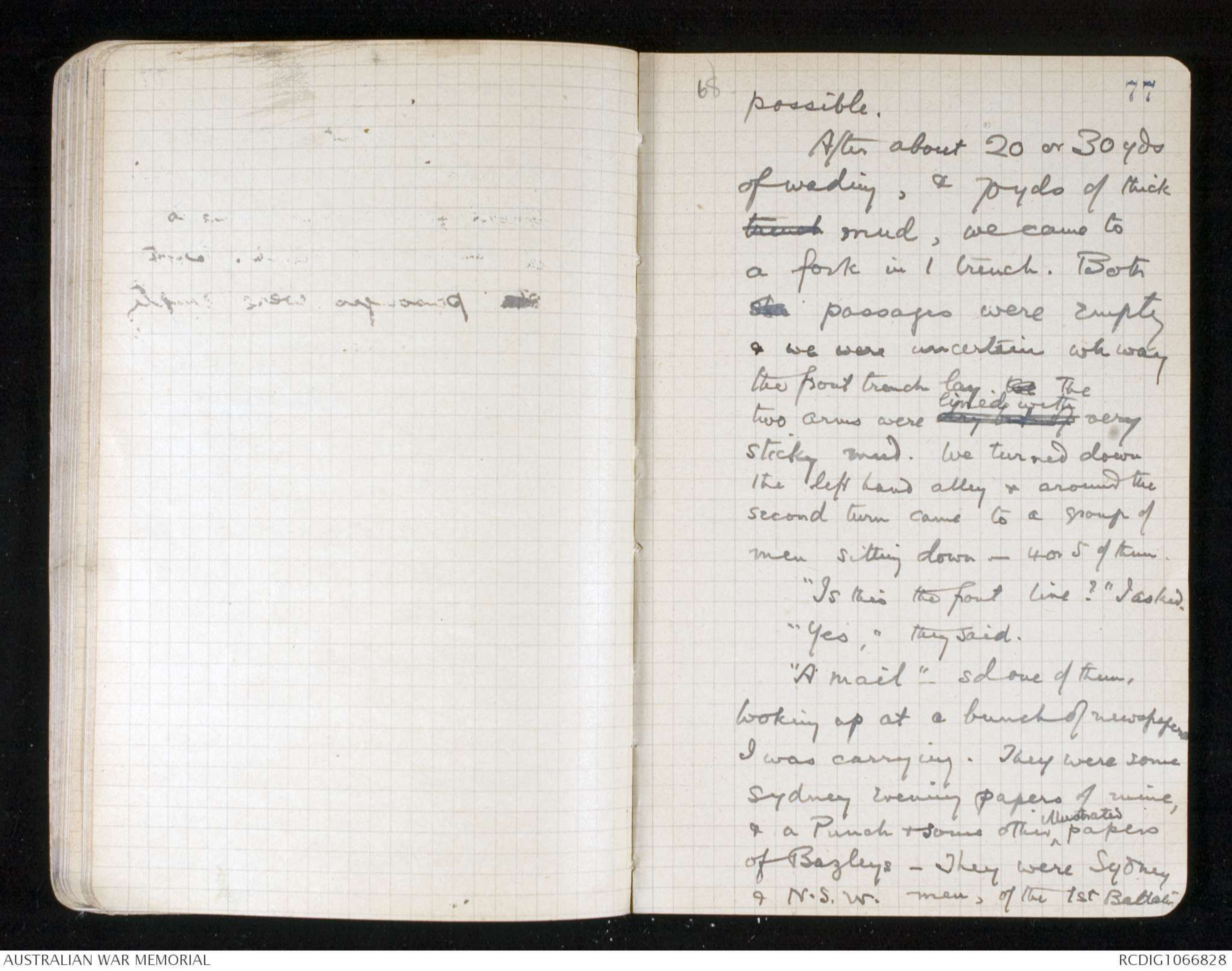
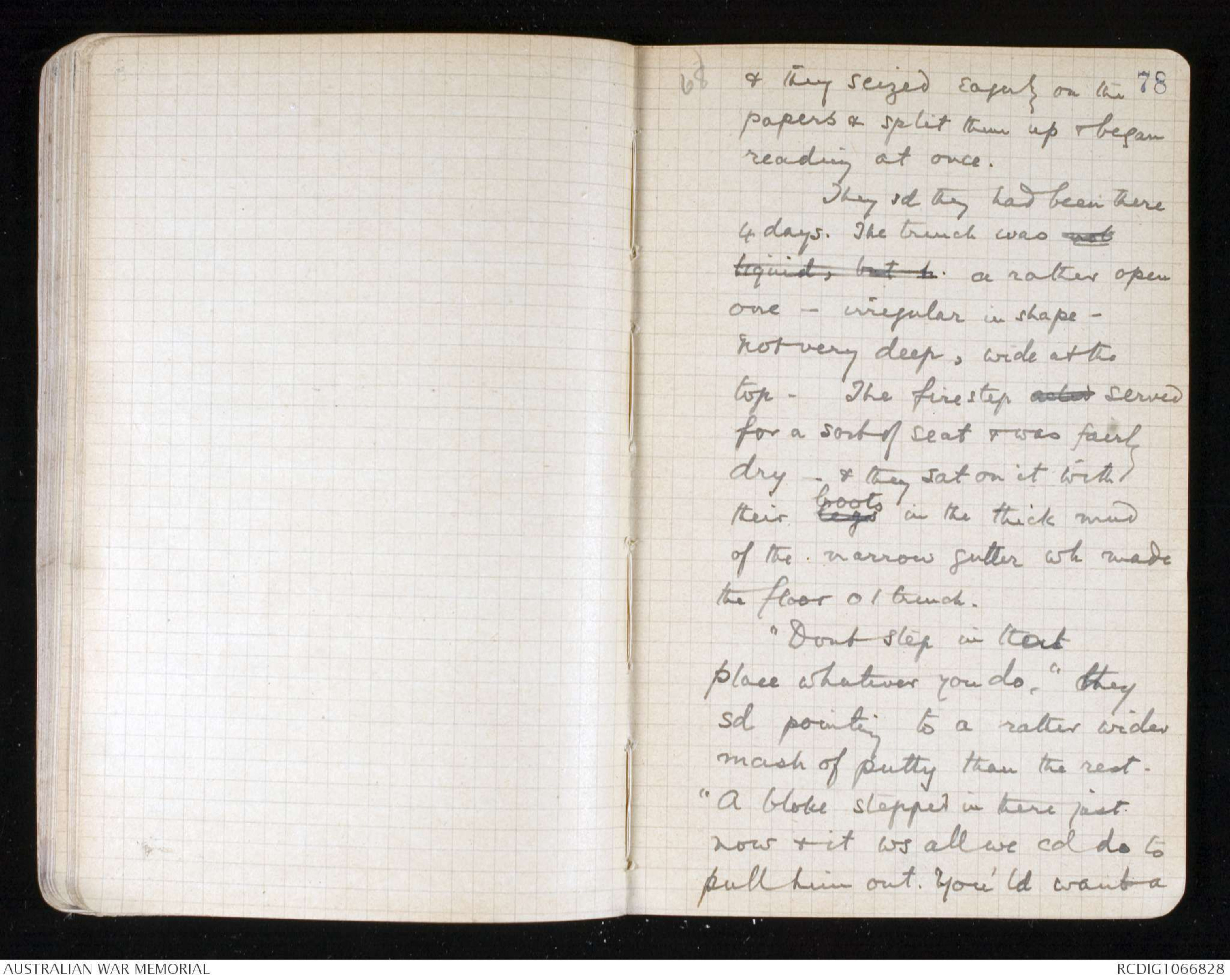
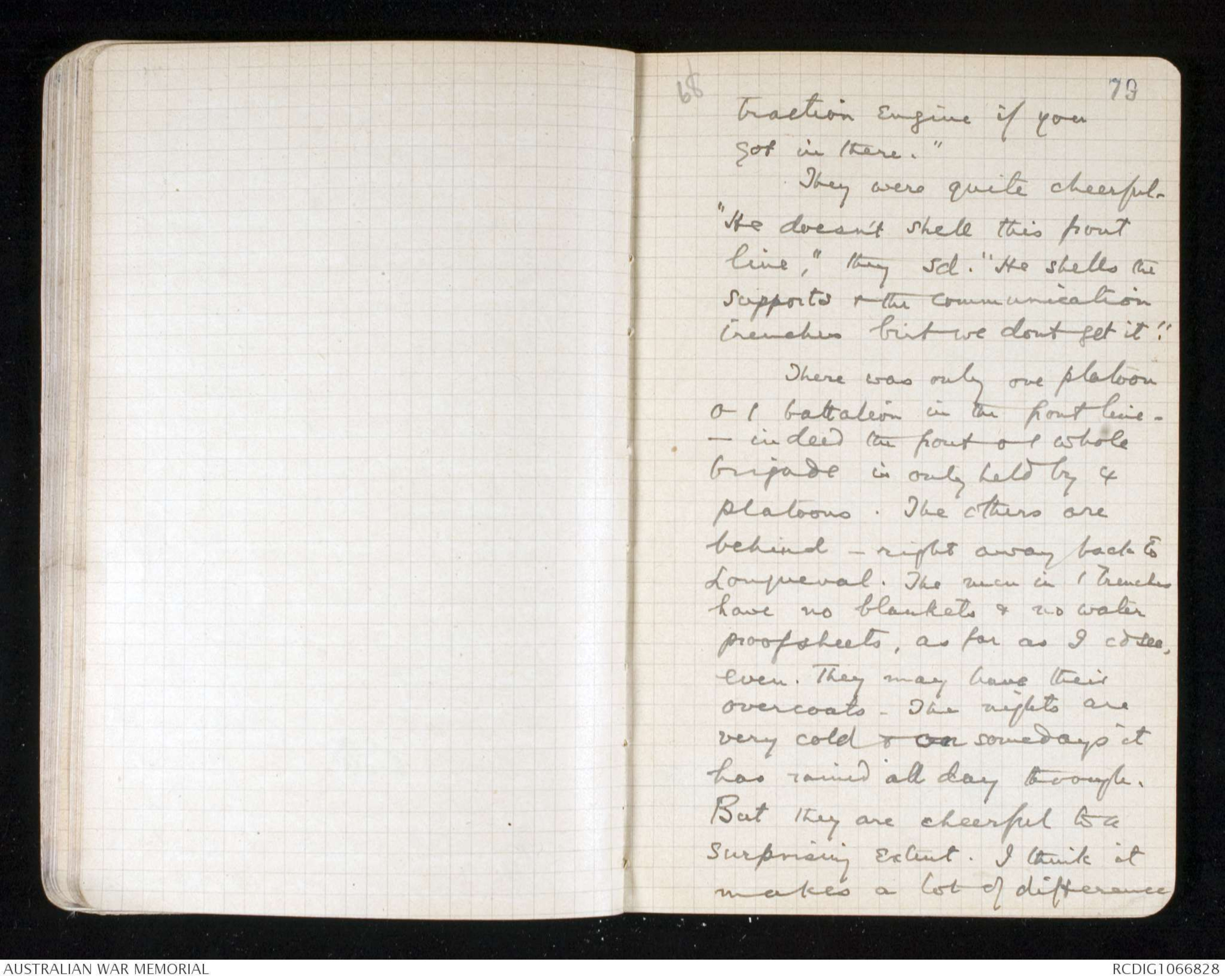
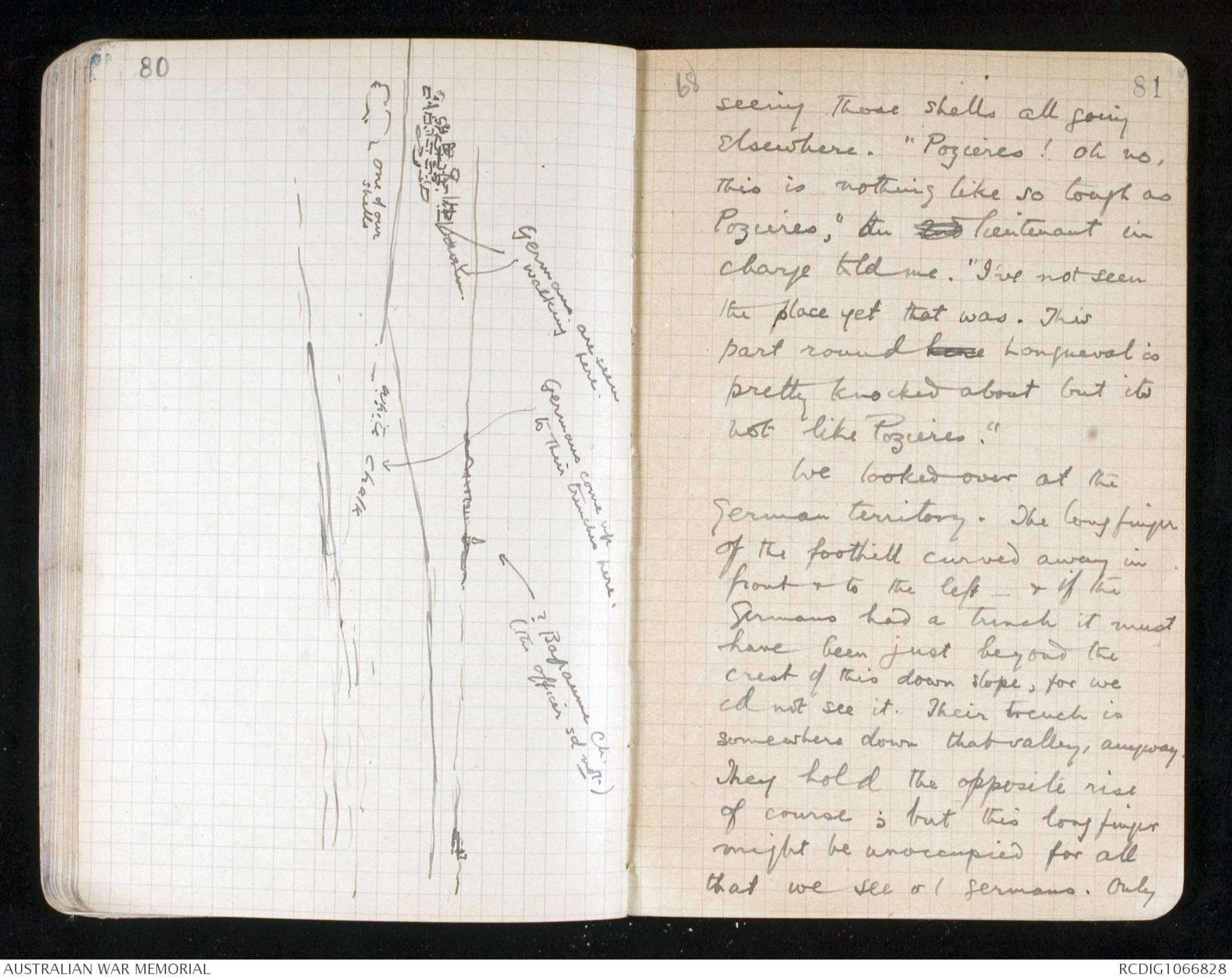
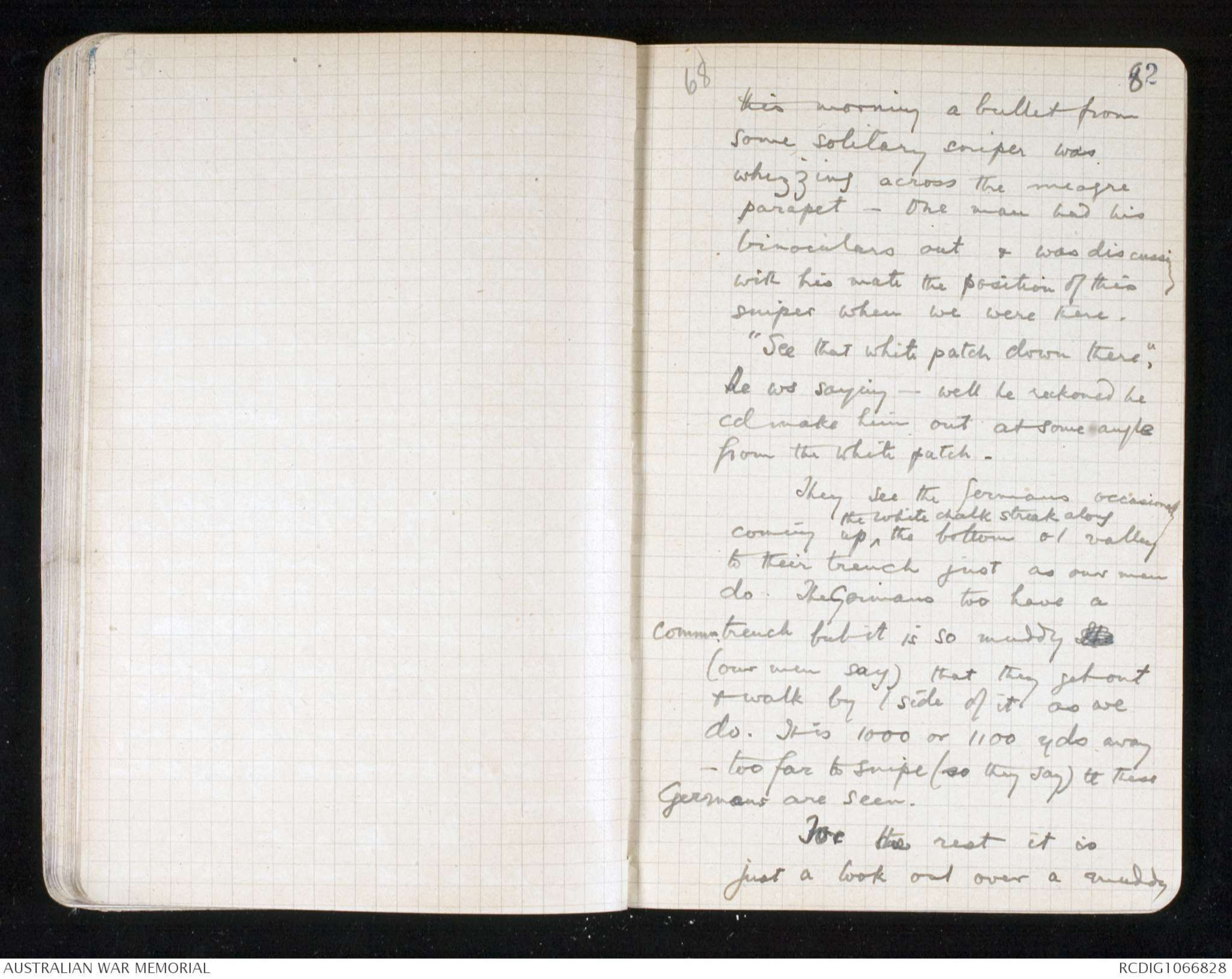
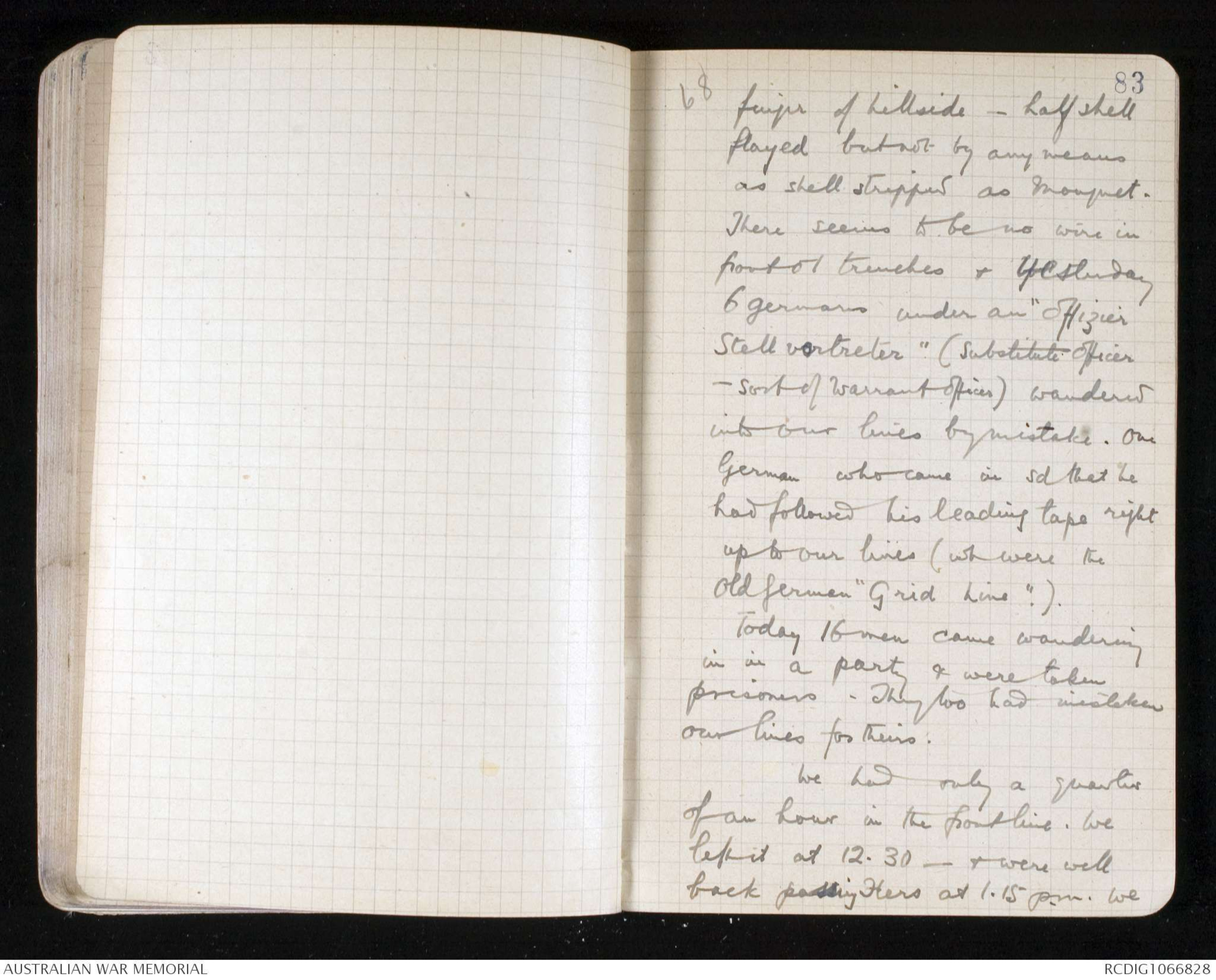
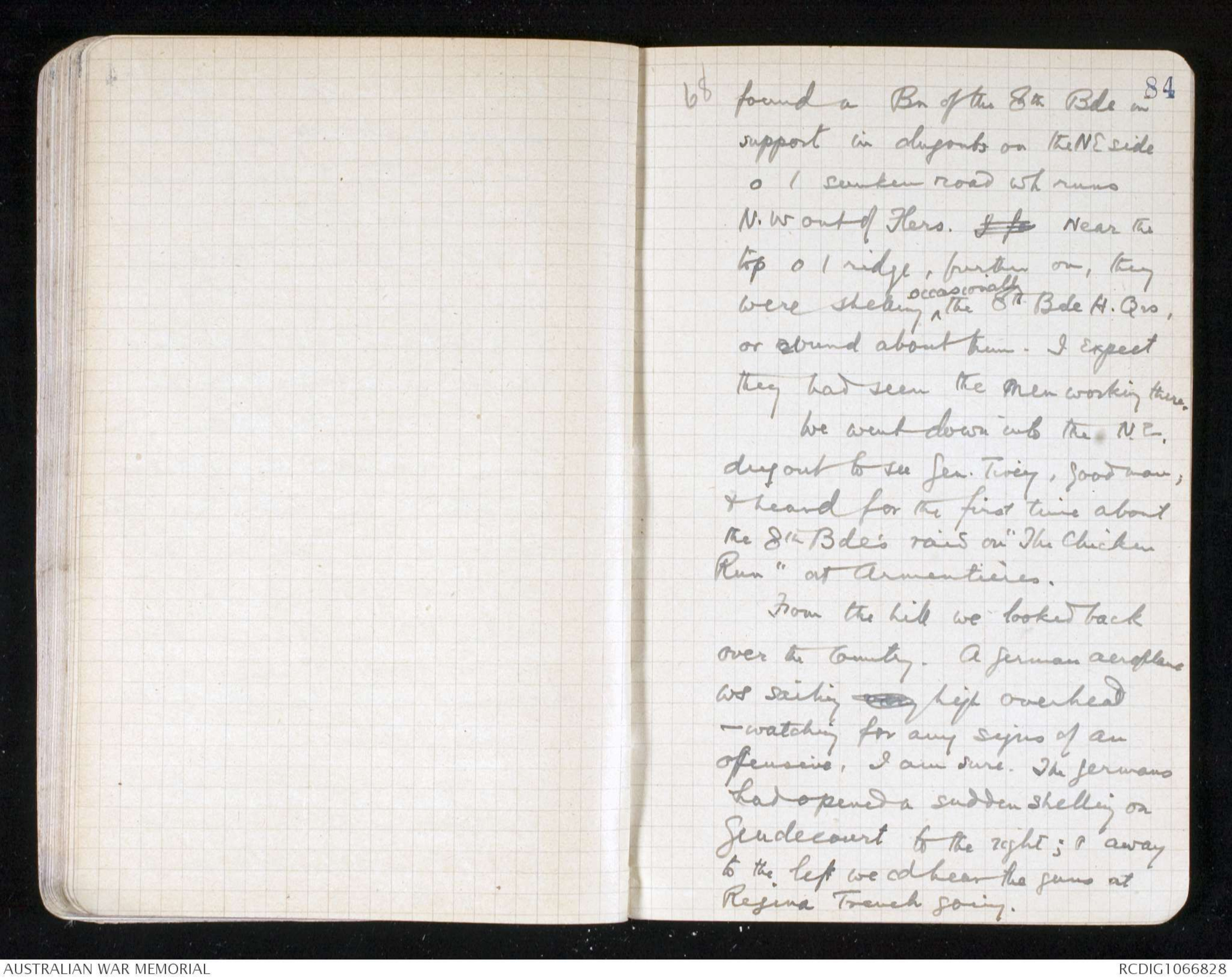
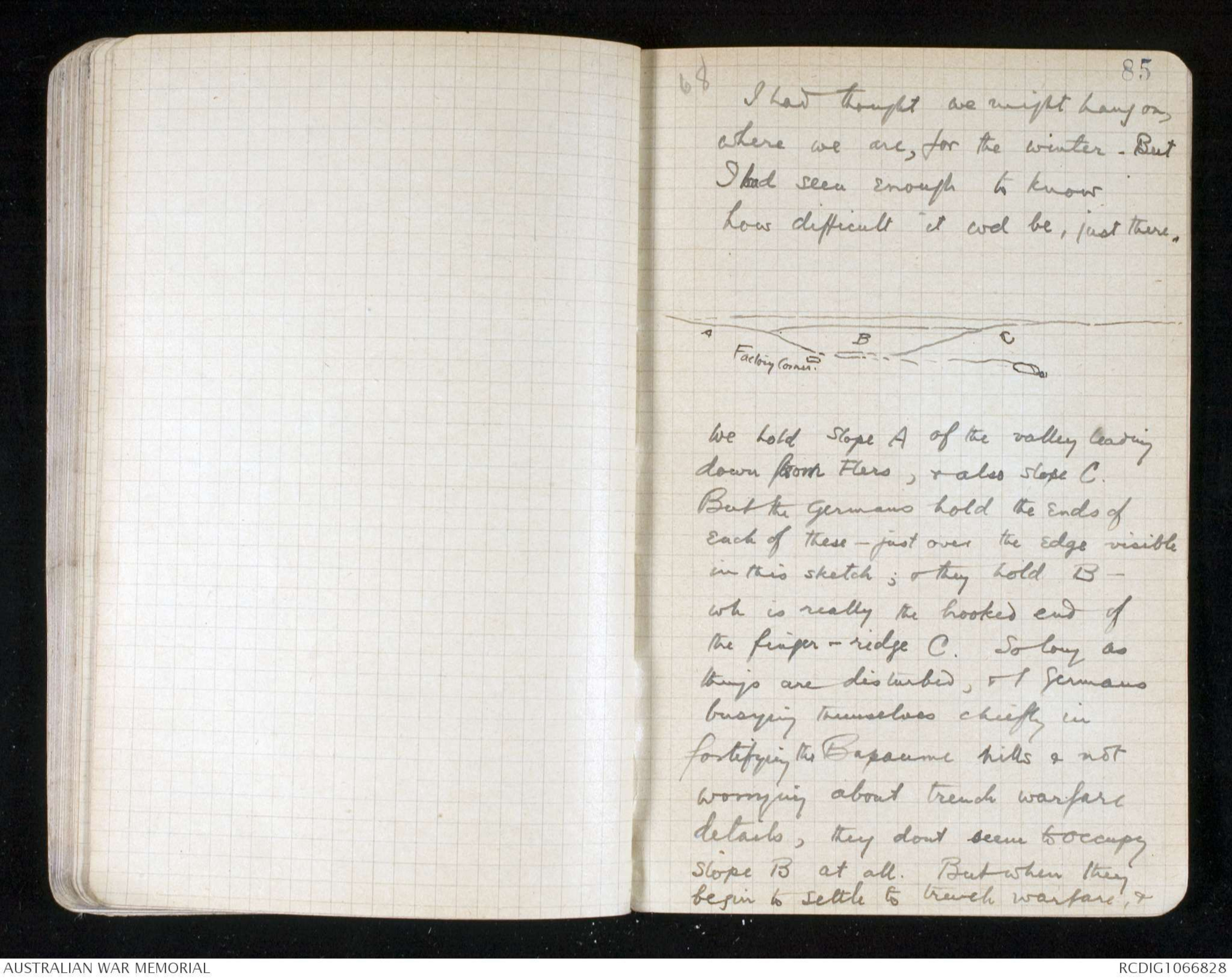
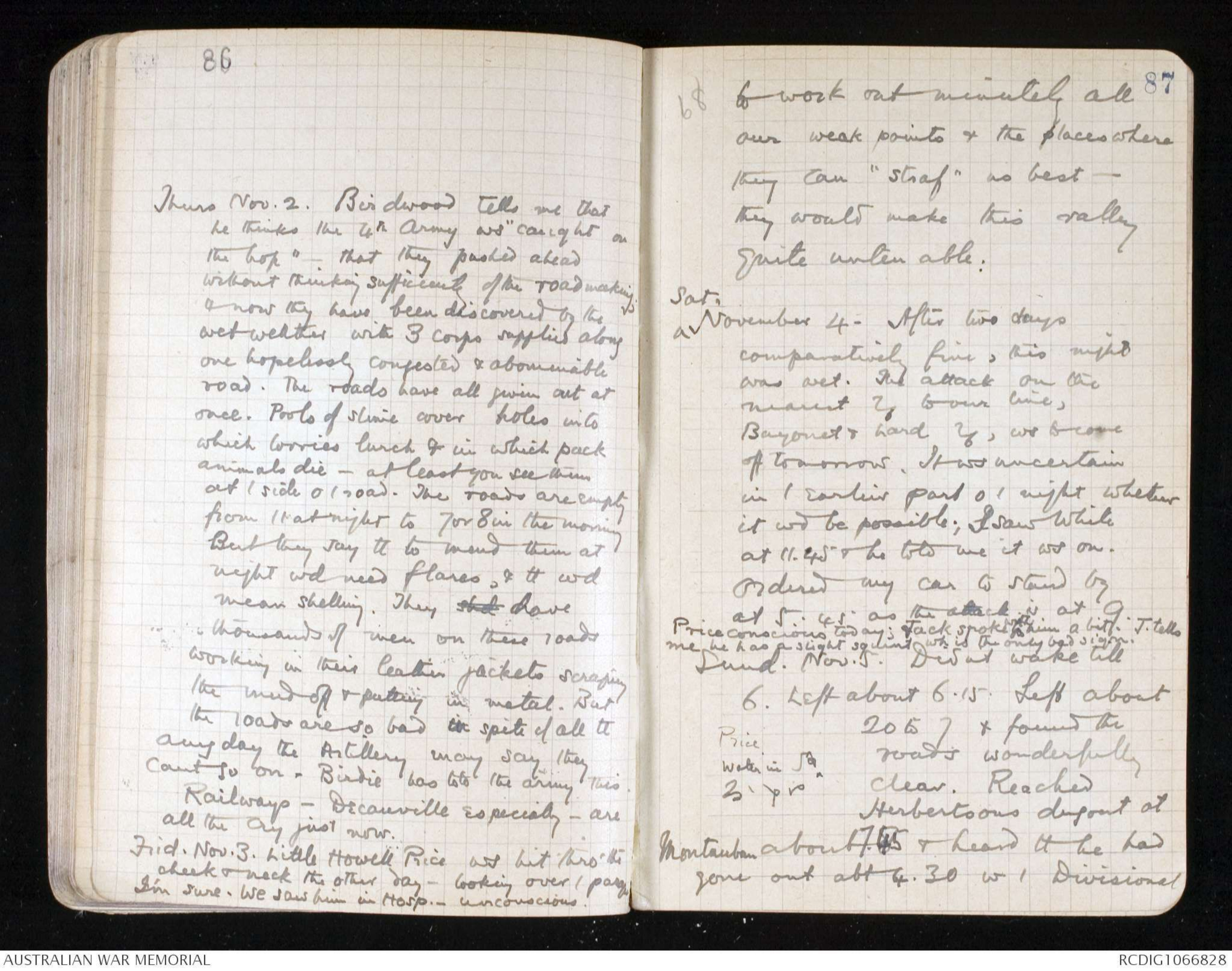
75
Diagram - see original
68 76
length of it & then were faced
by a channel of thin liquid
mud. There was nothing to
do but plunge on through
it. It soon came well over
my top boots - up to my
knees. We drove it along
the trench before us ^in waves as we waded.
It was extraordinarily buoyant
- like quicksilver. You could
not have sunk in it, I shd
think - although there is some
yarn abt a New Zealander
having des disappeared into
the mud entirely; tt he was
seen to enter some place &
never came out. I dont
personally place much any reliance
at all on these yarns (so many
one has found to be untrue).
But this one wd be quite
68 77
possible.
After about 20 or 30 yds
of wading, & 70 yds of thick
trench mud, we came to
a fork in / trench. Both
stn passages were empty
& we were uncertain wh way
the front trench lay. We The
two arms were dry but of lined with very
sticky mud. We turned down
the left hand alley & around the
second turn came to a group of
men sitting down - 4 or 5 of them.
"Is this the front line?" I asked.
"Yes," they said.
"A mail" sd one of them.
looking up at a bunch of newspapers
I was carrying. They were some
Sydney evening papers of mine,
& a Punch & some other ^illustrated papers
of Bazleys - They were Sydney
& N.S.W. men, of the 1st Battalion
68 78
& they seized eagerly on the
papers & split them up & began
reading at once.
They sd they had been there
4 days. The trench was not
liquid, but t a rather open
one - irregular in shape -
not very deep, wide at the
top - The firestep acted served
for a sort of seat & was fairly
dry - & they sat on it with
their legs boots in the thick mud
of the narrow gutter wh made
the floor o / trench.
"Dont step in that
place whatever you do," they
sd pointing to a rather wider
mash of putty than the rest -
"A bloke stepped in there just
now & it ws all we cd do to
pull him out. You'd want a
68 79
traction engine if you
got in there."
They were quite cheerful.
"He doesn't shell this front
line," they sd. "He shells the
supports & the communication
trenches but we dont get it."
There was only one platoon
o / battalion in the front line -
- indeed the front o / whole
brigade is only held by 4
platoons. The others are
behind - right away back to
Longueval. The men in / trenches
have no blankets & no water
proof sheets, as far as I cd see,
even. They may have their
overcoats - The nights are
very cold & on some days it
has rained all day through.
But they are cheerful to a
surprising extent. I think it
makes a lot of difference
80
Diagram - see original
68 81
seeing those shells all going
elsewhere. "Pozieres! oh no,
This is nothing like so tough as
Pozieres," the 2nd Lieutenant in
charge told me. "I've not seen
the place yet that was. This
part round here Longueval is
pretty knocked about but its
not like Pozieres."
We looked over at the
German territory. The long finger
of the foothill curved away in
front & to the left - & if the
Germans had a trench it must
have been just beyond the
crest of this down slope, for we
cd not see it. Their trench is
somewhere down that valley, anyway.
They hold the opposite rise
of course; but this long finger
might be unoccupied for all
that w see o / Germans. Only
68 82
this morning a bullet from
some solitary sniper was
whizzing across the meagre
parapet - one man had his
binoculars out & was discussing
with his mate the position of this
sniper when we were there.
"See that white patch down there,"
he ws saying - well he reckoned he
cd make him out at some angle
from the white patch.
They see the Germans occasionally
coming up ^the white chalk streak along the bottom o /
valley.
to their trench just as our men
do. The Germans too have a
commn. trench but it is so muddy the
(our men say) that they get out
& walk by / side of it as we
do. It is 1000 or 1100 yds away
- too far to snipe (so they say) tt these
Germans are seen.
For the rest it is
just a look out over a muddy
68 83
finger of hillside - half shell
flayed but not by any means
as shell stripped as Mouquet.
There seems to be no wire in
front o / trenches & yesterday
6 Germans under an "Offizier
Stell vortreter" (substitute officer
- sort of Warrant officer) wandered
into our lines by mistake. One
German who came in sd that he
had followed his leading tape right
up to our lines (wh were the
Old German "Grid Line.).
Today 16 men came wandering
in in a party & were taken
prisoners. They too had mistaken
our lines for theirs.
We had only a quarter
of an hour in the front line. We
left it at 12.30 - & were well
back passing Flers at 1.15 p.m. We
68 84
found a Bn of the 8th Bde in
support in dugouts on the NE side
o / sunken road wh runs
N.W out of Flers. I fo Near the
top o / ridge, further on, they
were shelling ^occasionally the 8th Bde H.Qrs,
or around about them. I expect
they had seen the men working there.
We went down into the N.Z.
dugout to see Gen. Tivey, good man,
& heard for the first time about
the 8th Bde's raid on "The Chicken
Run" at Armentieres.
From the hill we looked back
over the country. A German aeroplane
ws sailing very high overhead
- watching for any signs of an
offensive, I am sure. The Germans
had opened a sudden shelling on
Gueudecourt to the right; & away
to the left we cd hear the guns at
Regina Trench going.
68 85
I had thought we might hang on,
where we are, for the winter. But
I hd seen enough to know
how difficult it wd be, just there.
Diagram - see original
We hold slope A of the valley leading
down from Flers, & also slope C.
But the Germans hold the ends of
each of these - just over the edge visible
in this sketch; & they hold B -
wh is really the hooked end of
the finger - ridge C. So long as
things are disturbed, & / Germans
busying themselves chiefly in
fortifying the Bapaume hills & not
worrying about trench warfare
details, they dont seem to occupy
slope B at all. But when they
begin to settle to trench warfare, &
86
Thurs Nov. 2. Birdwood tells me that
he thinks the 4th Army ws "caught on
the hop" - that they pushed ahead
without thinking sufficiently of the road making,
& now they have been discovered by the
wet weather with 3 corps supplied along
one hopelessly congested & abominable
road. The roads have all given out at
once. Pools of slime cover holes into
which lorries lurch & in which pack
animals die - at least you see them
at / side o / road. The roads are empty
from 11 at night to 7 or 8 in the morning
But they say tt to mend them at
night wd need flares, & tt wd
mean shelling. They shd have
thousands of men on these roads
working in their leather jackets scraping
the mud off & putting in metal. But
the roads are so bad in spite of it all tt
any day the Artillery may say they
cant go on. Birdie has told the Army this.
Railways - Decauville especially - are
all the cry just now.
Frid. Nov. 3. Little Howell Price ws hit thro' the
cheek & neck the other day - looking over t parapet
I'm sure. We saw him in Hosp. - unconscious.
68 87
to work out minutely all
our weak points & the places where
They can “straf” us best -
they would make this valley
quite untenable.
^Sat. November 4. After two days
comparatively fine, this night
was wet. The attack on the
nearest trench to our line,
bayonet & hard trenches to come
off tomorrow. It ws uncertain
in the earlier part of the night whether
it wd be possible; I saw White
at 11.45 & he told me it ws on.
Ordered my car to stand by
at 5:45 as the attack is at 9.
Price conscious today; Jack spoke ^with him a bit. J. tells
me he has a slight squint wh is the only bad sign.
Sund. Nov. 5. Didnt wake till
6. Left about 6.15. Left about
20 to 7 & found the
roads wonderfully
clear. Reached
Herbertsons dugout at
Montauban about 7.45 & heard tt he had
gone out abt 4.30 w the Divisional
[* Price
water in [shorthand]
[shorthand]*]
 Sandy Mudie
Sandy MudieThis transcription item is now locked to you for editing. To release the lock either Save your changes or Cancel.
This lock will be automatically released after 60 minutes of inactivity.